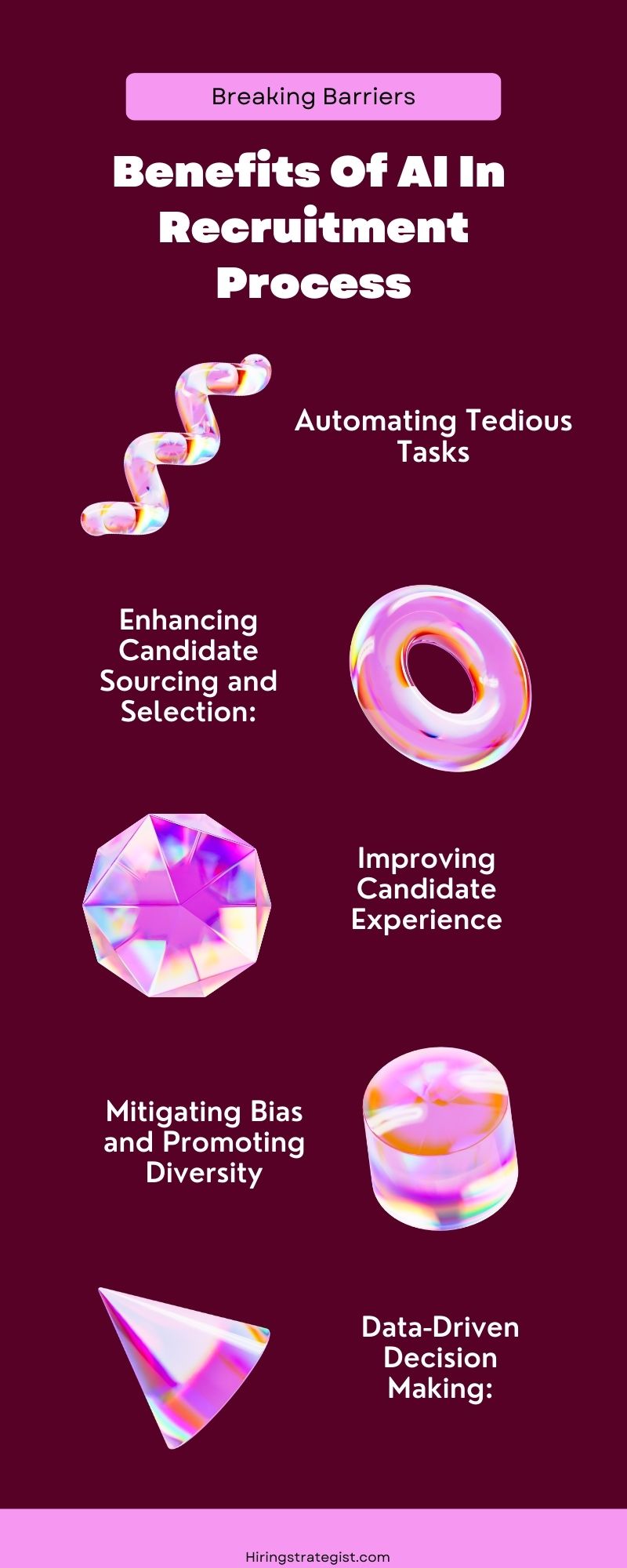With the global AI market expected to exceed $1.8 billion by 2030, it’s no wonder that over 45% of HR and recruitment professionals have already adopted AI into their hiring practices.
In the fast-changing world of recruitment, technology continues to play a significant role in reshaping traditional processes. In this blog post, we will explore the profound impact of AI in recruitment process and how it is transforming the way organizations attract and hire top talent. A big change lately is the use of Artificial Intelligence (AI) and this has really changed how hiring works.
Table of Contents
The Rise of AI in Recruitment:
Artificial Intelligence has gained momentum in recruitment due to its ability to analyze vast amounts of data quickly and accurately. With AI-powered tools, recruiters can streamline various stages of the recruitment process, including resume screening, candidate sourcing, and interview scheduling. These technologies leverage machine learning algorithms to identify patterns and predict candidate success, enabling recruiters to make data-driven decisions with greater efficiency and precision.
Benefits of AI in Recruitment Process:
The hiring landscape is evolving with AI at its core, offering a savvy and economical approach to expediting recruitment and enhancing hire caliber. Below is a detailed look at how AI can benefit various aspects of the hiring process.
Automating Tedious Tasks:
One of the most significant benefits of AI in recruitment is its capacity to automate tedious and time-consuming tasks. For instance, AI-driven Applicant Tracking Systems (ATS) can parse resumes, match candidates to job descriptions, and even conduct initial screenings based on predetermined criteria. By automating these repetitive tasks, recruiters can focus their time and energy on more strategic aspects of the hiring process, such as candidate engagement and relationship-building.

Enhancing Candidate Sourcing and Selection:
AI-powered tools also play a crucial role in enhancing candidate sourcing and selection. Advanced algorithms can analyze candidate profiles across various platforms and databases to identify potential matches for open positions. Additionally, AI-driven assessments and simulations can evaluate candidates’ skills and competencies objectively, providing valuable insights into their suitability for specific roles. By leveraging AI in candidate sourcing and selection, recruiters can access a broader talent pool and identify top candidates more efficiently.
Improving Candidate Experience:
Furthermore, AI technologies contribute to improving the overall candidate experience throughout the recruitment process. Chatbots and virtual assistants powered by AI can engage with candidates in real-time, providing instant responses to inquiries and guiding them through the application process. Additionally, AI-driven personalized communication tools can tailor interactions based on candidates’ preferences, ensuring a seamless and engaging experience from application to onboarding.
Mitigating Bias and Promoting Diversity:
Unconscious bias has long been a challenge in the hiring process. However, AI has the potential to mitigate bias by standardizing assessments and removing subjective decision-making. By analyzing large volumes of data, AI algorithms can identify patterns and make unbiased judgments based on qualifications and performance. This can lead to more diverse and inclusive hiring outcomes, benefiting both organizations and society as a whole.
Data-Driven Decision Making:
AI and technology enable organizations to collect and analyze vast amounts of data throughout the hiring process. This data can provide valuable insights into recruitment trends, candidate preferences, and the effectiveness of different sourcing channels. By leveraging these insights, recruiters can make data-driven decisions, optimize their hiring strategies, and continually improve their processes.
Challenges and Considerations:
While AI offers numerous benefits to recruitment processes, it is not without its challenges and considerations. Privacy concerns, algorithm bias, and the risk of over-reliance on technology are among the key issues that recruiters must address when implementing AI-driven solutions. It is essential for organizations to approach AI implementation thoughtfully, ensuring transparency, fairness, and accountability throughout the recruitment process.
Conclusion:
In conclusion, Artificial Intelligence is transforming recruitment processes in profound ways, from automating tedious tasks to enhancing candidate sourcing and selection. By leveraging AI-powered tools and technologies, recruiters can streamline operations, improve efficiency, and deliver a more personalized candidate experience. However, it is crucial for organizations to navigate the challenges and considerations associated with AI implementation to ensure its ethical and effective use in recruitment. As technology continues to advance, embracing AI will be essential for staying competitive in the ever-evolving landscape of talent acquisition.



